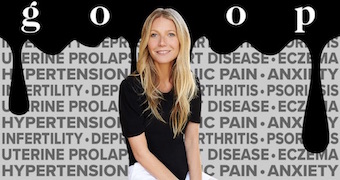Consumer protection organization Truth in Advertising has filed a complaint with two California district attorneys regarding marketing claims allegedly made by Goop, the lifestyle brand and digital media property founded by actress Gwyneth Paltrow.
The non-profit claims that an investigation into Goop's marketing practices identified more than 50 instances in which the site made deceptive health and disease-treatment claims without reliable scientific substantiation, which TINA claims are in violation of the law.
According to TINA’s investigation, this includes claims made by Goop that its products — or the third-party products it promotes — can “treat, cure, prevent, alleviate the symptoms of, or reduce the risk of developing a multitude of illnesses from depression and anxiety to infertility and arthritis.”
 |
Initially launched by Paltrow in 2008 as a weekly newsletter, the Goop site refers to itself as “an indispensable resource for all who love to make, go, get, do, be and see,” and states that its mission is to “share all of life’s positives.”
The site has been ensnared in controversy in recent years and excoriated by the press for its line of pseudo-scientific “wellness” products, often accompanied by snake-oil grade claims made without scientific basis.
The Better Business Bureau’s National Advertising Division last year launched an inquiry into Goop’s unsubstantiated claims that the “Moon Juice” line of dietary supplements it promotes improves brain function.
Former NASA chief scientist Mark Shelhamer blasted Goop this year after the site promoted a line of wearable stickers purporting to improve the body's energy reserves, stickers that it claimed were "made with the same conductive carbon material NASA uses to line space suits so they can monitor an astronaut’s vitals." In a statement, the aeronautics and aerospace agency said it did not use "any conductive carbon material lining" in its spacesuits. Shelhamer referred to Goop’s claims as a "load of BS."
TINA’s filing with government regulators comes after an August letter the group sent to Goop as well as its celebrity founder, requesting corrective action to be taken against some of the marketing claims made on its site. TINA claims the complaint was filed after Goop made only limited changes to the allegedly objectionable content in question.
“For far too long, Goop has exploited consumers with a deceptive marketing campaign that prioritizes profits over women’s health,” TINA.org executive director Bonnie Patten told O’Dwyer’s. “It’s time that the company’s use of disease-treatment claims end and Goop admits it has sold customers a bill of goods with no competent and reliable scientific evidence to substantiate its health-related advertising claims.”
Madison, Conn.-based Truth in Advertising, which was founded in 2010, is an online resource that aims to empower consumers against misleading, deceptive and fraudulent marketing practices.
The non-profit was recently behind court filings regarding allegedly deceptive claims made by pillow company MyPillow and Revlon’s Almay cosmetics line.


 Abandon traditional content plans focused on a linear buyer progression and instead embrace a consumer journey where no matter which direction they travel, they get what they need, stressed marketing pro Ashley Faus during O'Dwyer's webinar Apr. 2.
Abandon traditional content plans focused on a linear buyer progression and instead embrace a consumer journey where no matter which direction they travel, they get what they need, stressed marketing pro Ashley Faus during O'Dwyer's webinar Apr. 2. Freelance marketers and the companies that hire them are both satisfied with the current work arrangements they have and anticipate the volume of freelance opportunities to increase in the future, according to new data on the growing freelance marketing economy.
Freelance marketers and the companies that hire them are both satisfied with the current work arrangements they have and anticipate the volume of freelance opportunities to increase in the future, according to new data on the growing freelance marketing economy. Home Depot's new attempt to occupy two market positions at once will require careful positioning strategy and execution to make it work.
Home Depot's new attempt to occupy two market positions at once will require careful positioning strategy and execution to make it work. Verizon snags Peloton Interactive chief marketing officer Leslie Berland as its new CMO, effective Jan. 9. Berland succeeds Diego Scotti, who left Verizon earlier this year.
Verizon snags Peloton Interactive chief marketing officer Leslie Berland as its new CMO, effective Jan. 9. Berland succeeds Diego Scotti, who left Verizon earlier this year.  Norm de Greve, who has been CMO at CVS Health since 2015, is taking the top marketing job at General Motors, effective July 31.
Norm de Greve, who has been CMO at CVS Health since 2015, is taking the top marketing job at General Motors, effective July 31.


 Have a comment? Send it to
Have a comment? Send it to 
No comments have been submitted for this story yet.